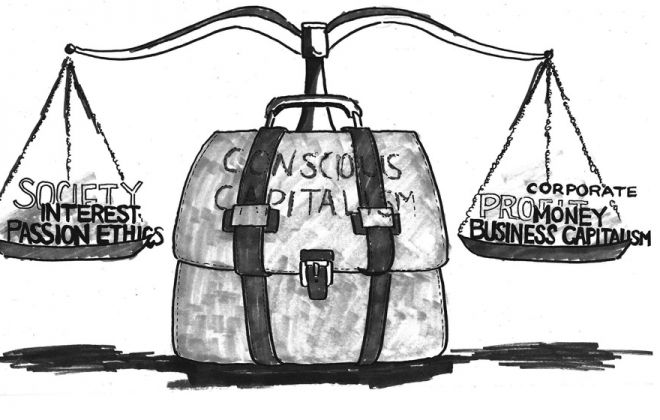It seems ironic to put the word “conscious” and “capitalism” together however this new movement is sweeping the world and resulting in a much needed shift in the way we do business.
The phrase Conscious Capitalism has become famous after the co-CEO of Whole Foods John Mackey and marketing professor, Raj Sisodia penned a book by the same name in order to promote this new way of doing business.
The word “capitalism” has long been synonymous with financial greed and corruption that results in the rich getting richer and the poor getting poorer.
However, this new generation born between 1982 and 2004- often referred to as the Millenials, have a wider, more conscious approach when it comes to life and therefore in order for businesses to appeal to the consumer, they too have to adopt these conscious trends.
According to authors, Mackey and Sisodia, Conscious Capitalism refers to businesses that “serve the interests of all major stakeholders- customers, employees, investors, communities, suppliers and the environment,” while being “grounded in a higher sense of purpose to enhance its positive impact on the world.”
Recent polls have revealed the following trends:
-74% consumers believe that “social consciousness” is ‘very important’ or ‘somewhat important’ in determining where they choose to shop. (2012 NPD and Civic Science Poll)
– “Social purpose” as the trigger between quality and price was up by 26% from 2008 (2012 Edelman Poll)
– 43% of consumers aged 21-24 and 52% of those aged 25 to 29 were willing to spend more on a product that supports a noteworthy cause (Neilsen’s Global Survey on Corporate Social Responsibility)
– 47% of consumers buy at least one brand that supports a good cause every month which is a 50% increase from 2010. (2012 Edelman Good Purpose Survey)
– 72% of consumers said they would recommend a product that supported a good cause which is a 40% increase since 2012.
The proof is also in the amazing 1025% growth of conscious companies in the last 10 years which includes big brands like Whole Foods, The Container Store and many more.
These growing trends have business analysts believing that ‘unconscious’ companies will simply not be able to survive in the future.
A good example of this is the retail giant Walmart, whose employees often strike and receive nothing more than minimum wage. The company has faced declines every quarter since 2013 and considering these current consumer trends, Walmart may not survive if they fail to change.
The same has been seen in the fast food industry as more consumers become conscious of how food is prepared, the quality of what they are eating and where there food comes from. In recent years, many fast food chains have been forced to change their strategy by offering healthier options and being more transparent about their ingredients.
The internet really is helping consumers to become much more aware and empowered when it comes to making decisions over what to purchase and marketers are become savvy to the fact that having a “share-worthy” product and brand can mean big business.
So, whether you are an owner, employer or employee we can all afford to take a more conscious approach to how we work or run a business not just because it will increase profits but because it will help make the world a better place.
References:
Only Conscious Capitalists will Survive by Jeff King
Conscious Capitalism: How Millennials are Shaping a New Economic Paradigm by Dr. Kelly Neff
